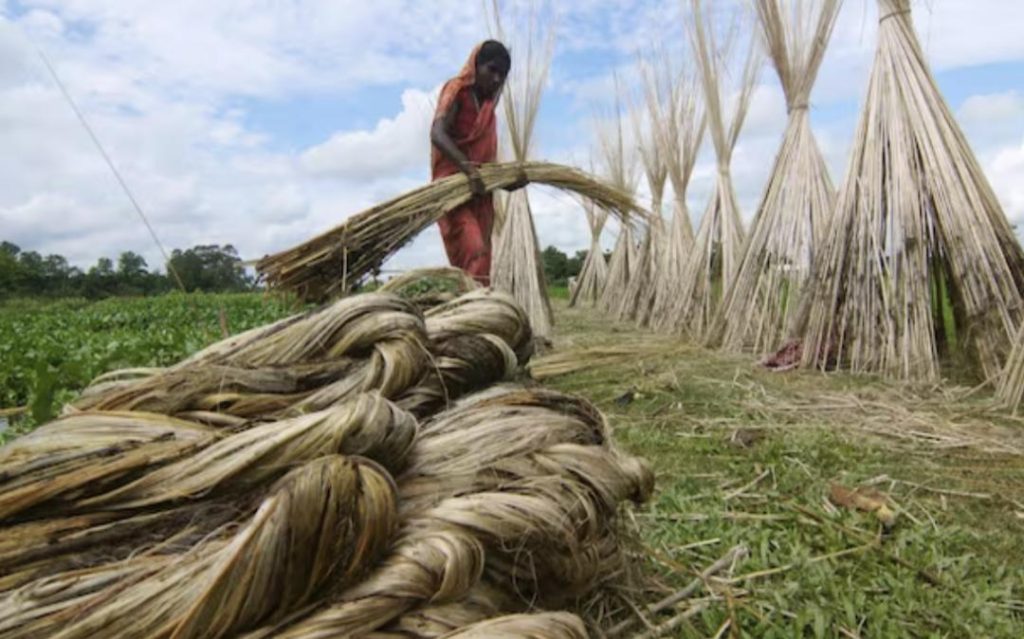
India Restricts Imports of Jute, Allied Fibre Products from Bangladesh
India has taken a significant step to protect its domestic jute sector by imposing port restrictions on the import of jute and allied fibre products from Bangladesh with immediate effect. The move aims to curb cheap and subsidised imports, counter unfair trade practices, boost the “Atmanirbhar Bharat” initiative, and protect rural livelihoods tied to the domestic jute sector.
The restrictions apply across land and seaports, with the exception of the Nhava Sheva seaport. This decision comes amid a surge in subsidised imports from Bangladesh, which has been affecting the domestic jute industry. The Indian government’s move is seen as a crucial step to promote the growth and development of the domestic jute sector, which is a significant contributor to the country’s agricultural economy.
The jute sector is a major source of employment and income for millions of rural households in India, particularly in the eastern states of West Bengal, Bihar, and Odisha. The sector is also a significant contributor to the country’s foreign exchange earnings. However, the surge in subsidised imports from Bangladesh has been detrimental to the domestic jute industry, leading to mill closures and job losses.
The Indian government’s decision to impose port restrictions is expected to help level the playing field for the domestic jute industry. By restricting imports, the government aims to encourage domestic production and reduce the dependence on imports. This move is also expected to boost the “Atmanirbhar Bharat” initiative, which aims to promote self-reliance and reduce dependence on imports.
The restrictions on jute imports from Bangladesh are a significant development in the ongoing trade tensions between the two countries. India and Bangladesh have been engaged in a trade dispute over the issue of subsidised imports, with India accusing Bangladesh of violating trade agreements and engaging in unfair trade practices.
India has been a major importer of jute and allied fibre products from Bangladesh, with the country accounting for a significant share of India’s total jute imports. However, the surge in subsidised imports from Bangladesh has been affecting the domestic jute industry, leading to concerns over the long-term viability of the sector.
The Indian government’s decision to impose port restrictions is expected to have a significant impact on the jute industry in Bangladesh. The country’s jute industry is a significant contributor to its economy, and a reduction in exports to India could have a negative impact on the industry.
In response to the Indian government’s decision, the Bangladesh Jute Mill Owners Association has expressed concerns over the impact of the restrictions on the country’s jute industry. The association has urged the government to negotiate with India to resolve the trade dispute and find a lasting solution to the issue.
The Indian government’s decision to impose port restrictions on jute imports from Bangladesh is a significant step towards promoting the growth and development of the domestic jute sector. The move is expected to boost the “Atmanirbhar Bharat” initiative, reduce dependence on imports, and protect rural livelihoods tied to the domestic jute sector.
As the Indian government continues to implement measures to promote the growth of the domestic jute sector, it is essential to ensure that the sector is able to compete effectively with imports. This can be achieved through a combination of measures, including providing support to domestic jute mills, promoting research and development in the sector, and protecting the sector from unfair trade practices.
In conclusion, the Indian government’s decision to impose port restrictions on jute imports from Bangladesh is a significant step towards promoting the growth and development of the domestic jute sector. The move is expected to boost the “Atmanirbhar Bharat” initiative, reduce dependence on imports, and protect rural livelihoods tied to the domestic jute sector.






